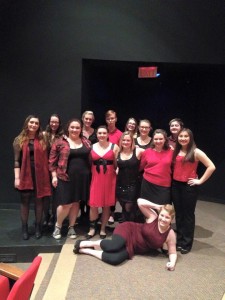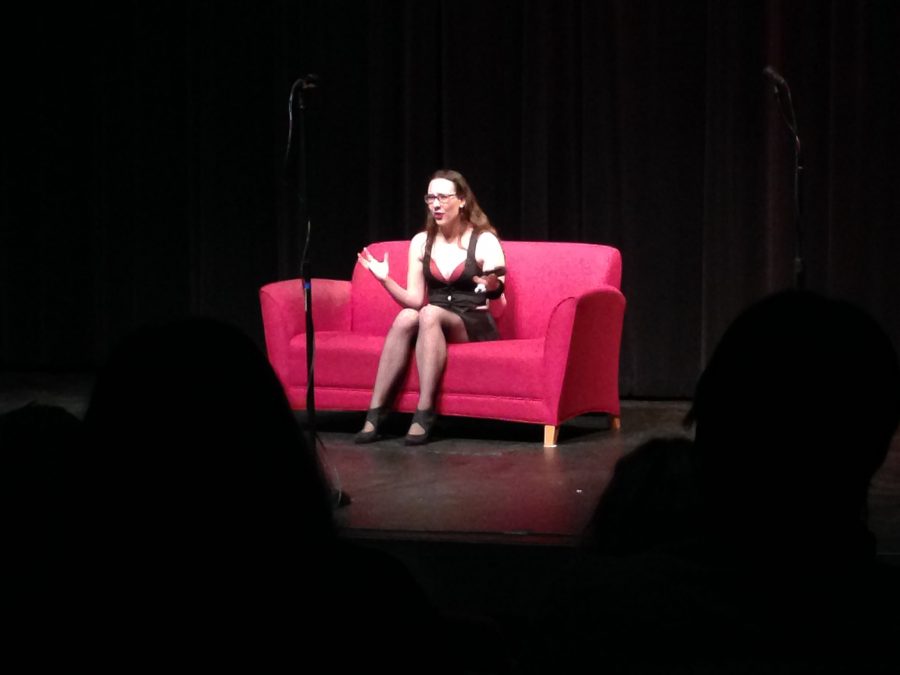On Friday, February 13, the Chatham University Drama Club staged their annual production of Eve Ensler’s episodic play, “The Vagina Monologues,” based on Ensler’s interviews with 200 women about relationships, sex, violence against women, and—of course—vaginas.
Just after 7:00 p.m., co-director Catherine Giles took the stage at Eddy Theatre to welcome everyone in the nearly full auditorium to the 2015 production. She noted that the performance would be supporting the organization POWER (Pennsylvania Organization for Women in Early Recovery), which assists women in overcoming drug and alcohol addictions.
As usual, the production ranged in tone from hilarious to tragic.
Probably the most well-received monologue was junior Phoebe Armstrong’s performance of, “The Woman Who Loved to Make Vaginas Happy,” about a sex worker who works exclusively with women. Armstrong’s lively demonstration of a range of the types of moans women let out during sex—including clitoral moans, vaginal moans, bisexual moans, and college moans, to name just a few—had the crowd in stitches.
Also relatively lighthearted and definitely entertaining were performances by seniors Jenny Schollaert and Skyler Wilcha.
Schollaert took the stage as a woman who became acquainted with her vagina in an enlightening vagina workshop. Her passionate performance clearly communicated the rush that comes with getting to know one’s own body, and her liveliness kept the audience engaged and amused throughout her performance.
Wilcha performed a monologue about the, “not politically correct,” way a woman came to love her vagina. As she communicated via a staged telephone call to the production’s narrator, sophomore Indigo Baloch, Wilcha’s character came to accept herself by seeing her body through the eyes of an adoring man.
Wilcha’s conversational delivery and her descriptions of the entirely average man who helped her appreciate herself garnered much laughter from the crowd. The biggest laugh she received probably came from her line about the character’s first impression of this man: “I didn’t particularly like Bob,” she said.
These scenes were in stark contrast with two of the most heartbreaking in Ensler’s collection of monologues.
The first was, “They Beat the Boy Out of My Girl…Or So They Thought,” about the struggles of living as a transgender woman, performed by first-years Maya Carey and McKenzie Gordon, sophomores Baloch and Maggie McGovney, and junior Kelly Nestman.
The ensemble’s perfectly timed monologue was an emotional roller coaster. It addressed the childhood bullying that those who do not comply with “gender norms” face, the need that the bullied feel to hide their true identities for their own safety, the happiness and hopefulness that comes with finding people who are accepting of your true identity regardless of the one society assigns at birth, and the tragedy when a partner is killed simply because of their association with a transgendered woman.

The second harrowing scene was junior Rachael Owen’s rendition of, “My Vagina was My Village,” a story from the perspective of a victim of rape as a war tactic. She detailed the emotions that arise from rape and how this violation can be so destructive to a woman’s relationship with herself and her body. The character—who was violated with objects, including the barrel of a gun, and then gang raped—likened this heinous act to the pillaging of a formerly happy village between her legs.
“They invaded it, butchered it, and burned it down,” recited Owens.
After both of these affecting scenes, as well as several others, audible sniffles could be heard from the audience.
Many of the monologues dealt with issues with which much of the audience could either identify or empathize.
The audience reveled in Lyons’s profanity-riddled monologue called, “My Angry Vagina,” in which she bemoaned all of the horrible things vaginas have to put up with, including uncomfortable tampons, unnecessary cleaning supplies, and unpleasant exams.
Senior Bertie Yarroll performed a monologue based on one woman’s story about how her ex-husband forced her to remove her pubic hair, though such hair is natural and purposeful.
First-year Bethany Bookout gave an impassioned performance of a monologue titled, “My Short Skirt,” stating that wearing a short skirt is not an invitation for scrutiny or forced entry; it is an entirely personal experience.
Bookout’s final line encapsulated a sentiment that most contemporary American women have, at one point or another, wanted to scream at the top of their lungs: “My short skirt—and everything under it—is mine. Mine. Mine.”
Sophomore Tahmina Tursonzadah ended the show with an earnest and emotional execution, “My Revolution Begins In the Body.” The revolution of which this monologue speaks is one against patriarchal thinking and all of the barriers that the women depicted in Ensler’s play face.
There are things for which it is worth standing up, like gender equality, the end of violence, and the teaching of self-worth. Chatham University Drama Club’s annual presentation of, “The Vagina Monologues,” serves as a yearly reminder to, indeed, stand up.


